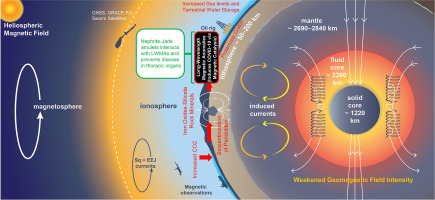 Retraction Watch has an interesting article about a very curious paper published in Science of the Total Environment. In fact, the paper and communication from the lead author are so bad I have to wonder if its a Sokal-like prank. If not, it is more evidence that the world has become so weird there are many things which are beyond satire. But let’s take this at face value. The title of the paper is: “Can Traditional Chinese Medicine provide insights into controlling the COVID-19 pandemic: Serpentinization-induced lithospheric long-wavelength magnetic anomalies in Proterozoic bedrocks in a weakened geomagnetic field mediate the aberrant transformation of biogenic molecules in COVID-19 via magnetic catalysis.”
Retraction Watch has an interesting article about a very curious paper published in Science of the Total Environment. In fact, the paper and communication from the lead author are so bad I have to wonder if its a Sokal-like prank. If not, it is more evidence that the world has become so weird there are many things which are beyond satire. But let’s take this at face value. The title of the paper is: “Can Traditional Chinese Medicine provide insights into controlling the COVID-19 pandemic: Serpentinization-induced lithospheric long-wavelength magnetic anomalies in Proterozoic bedrocks in a weakened geomagnetic field mediate the aberrant transformation of biogenic molecules in COVID-19 via magnetic catalysis.”
Many scientific publications are extremely technical and require very long technical descriptions, but my “gratuitous jargon” alarm went off at this title. The paper itself is worse – I get the distinct impression it is using jargon not to be precise, but to impress and befuddle. But wading through the jargon, the claim here that has caught attention is this – “Nephrite-Jade amulets, a calcium-ferromagnesian silicate, may prevent COVID-19.” What? Wearing a jade amulet may prevent COVID-19? You are going to have to do better than dazzling with jargon to make that claim stick, or even to get it taken seriously. The fact that the authors reference Traditional Chinese Medicine (TCM) does not help either.
The co-founder of Retraction Watch, Ivan Oransky, wanted to get to the bottom of it also, so he wrote the following e-mail to the corresponding author, Moses Turkle Bility, PhD. Oransky wrote:
“Dr. Bility
I blog at Retraction Watch. Can you confirm that you co-authored this paper?”
That was it – a very simple query to confirm authorship. This is pretty standard in academia, just dotting all the i’s. This was Dr. Bility’s response:
Dear Dr. Ivan Oransky, yes, I published that article, and I kindly suggest you read the article and examine the evidence provided. I also suggest you read the history of science and how zealots have consistently attempted to block and ridicule novel ideas that challenge the predominant paradigm from individuals that are deem not intelligent enough. I not surprised that this article has elicited angry responses. Clearly the idea that a black scientist can provide a paradigm shifting idea offends a lot of individuals. I’ll be very candid with you; my skin color has no bearing on my intelligence. If you have legitimate concerns about the article and wish to discuss, I’ll address; however, I will not tolerate racism or intellectual intolerance targeted at me.
Whoa, where is that coming from? I suspect that Dr. Bility has already received some pushback prior to getting the very innocent query from Retraction Watch, but such a response is extremely telling. Bility immediately goes for the “small minded bigots can’t appreciate my paradigm-shifting brilliance” card. Sorry, Dr. Bility, but with that reaction you just branded yourself a crank and a pseudoscientist. Perhaps that’s not fair, but neither is this massively out-of-proportion response.
Continue Reading »

 Recently someone
Recently someone  Retraction Watch
Retraction Watch 




